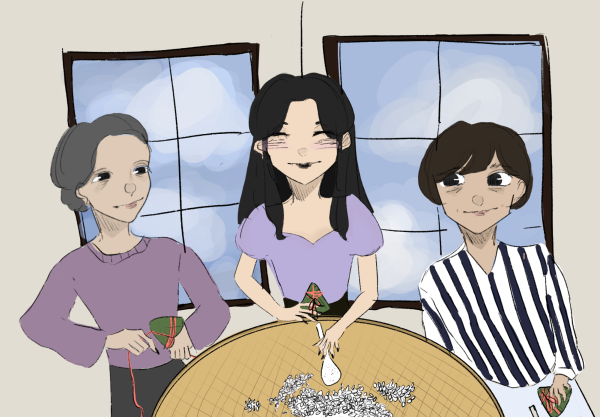In my Asian family, food has always been our language of love. My mother always has a plate of sliced fruit ready for my siblings and me to enjoy after school, my father peels my shrimp tails off for me because he knows I love seafood but hate to get my hands oily, and even when I haven’t seen my grandmother in a few years, she will always remember what my favorite dishes are and how I like my eggs cooked in the mornings.
For this reason, I never feel more loved than when I hear the racket of my parents in the kitchen as dinner time approaches. Throughout the house, you can hear the rhythmic chop chop chop of my dad dicing up some scallions and the sizzle of hot oil when my mom stir-fries some bok choy, accompanied by the hum of the droning kitchen fan and the loud clatter of pans in the sink. Though one might categorize this as a cacophonous disaster, it is music to my ears. After all, the livelier the kitchen, the heartier the meal.
Our household of five is the only members of our extended family who live outside of China. As a result, my parents try to keep my siblings and me close to our roots and treat us to a home-cooked dinner of traditional Chinese cuisine every night.
Day after day, when our rice cooker sings a sweet melody to signal for us to set the table, my parents carry over plates and pots of steaming hot dishes and soups. From fried mung bean sprouts to sweet and sour soup, beyond their deliciousness, these meals are so special because they’re crafted with recipes that have been passed down: my parents learning from their parents, and so forth.
My father likes to recount how he first learned to cook at only 12 years old, and I picture a much younger him standing alongside my grandmother in a cramped kitchen in China, glasses fogging up from the steaming food. This story is told as a subtle nudge encouraging me to also learn how to cook. However, unlike my father, I am currently 18 with no knowledge of how my family marinates meat or seasons green beans.
The absence of my Chinese culinary skills became apparent when my grandmother and great-aunts taught me how to wrap zongzi last summer, a rice dumpling stuffed with various fillings. As we circled around a table, I watched them effortlessly stuff the rice with pork and enclose it with bamboo leaves and twine. Their hands, though worn with age, were still nimble. When my turn came, my rice was spilling out of my crinkled bamboo leaf around the zongzi, and the twine was not wrapped tightly enough. Though my elders still praised me, you could easily pick out which zongzi were the ones that I made: they were the most lopsided and oddly-shaped of the group. Most concerningly, when I walked into dinner that night, I saw the table covered in various dishes and realized that it took me a whole afternoon to barely learn only one of our many family recipes.
My inexperience on this front had not bothered me in the past. After all, I felt I had lots of time to learn. However, deep into my senior year, each passing dinner is an unyielding reminder that in a few months, I won’t be able to savor my parents’ dishes each night. In a few short months, if I’m craving my parents’ cooking, my best bet would be to head to a university dining hall and hope that there is some sort of subpar Chinese cuisine available.
I do not want my family’s recipes to be lost because of my lack of knowledge, and it is unfortunate that it took the realization of my numbered days at home to motivate me to learn how to cook. Now, more than ever, I am recognizing the importance of keeping my heritage alive through cooking, and learning some of these recipes is one of my top priorities this summer.
After all, if food is an expression of love in my family, wouldn’t I want to reciprocate? Wouldn’t I want to spend time with my parents or grandparents in the kitchen, tasting the saltiness of our soup and wiping the sweat beading on our foreheads? Wouldn’t I want to make these recipes for myself once I move out, when eating my parents’ cooking becomes a luxury at reunions instead of a daily occurrence? Wouldn’t I want to, one day, set the table with these dishes for future generations?
I most definitely would.





